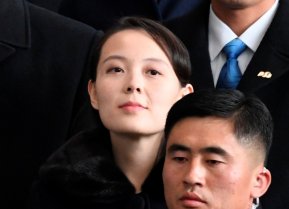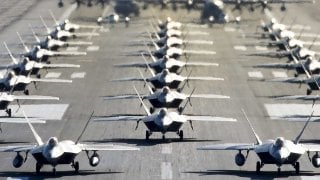The Real Reason North Korea Is Threatening War
With Kim Jong-un’s recent statements that he considers the Republic of Korea (ROK) the “primary enemy” and no longer seeks peaceful unification, analysts in Korea and the United States are rightly concerned with the possibility that he may conduct an unprecedented provocation or even an attack on the ROK.
With Kim Jong-un’s recent statements that he considers the Republic of Korea (ROK) the “primary enemy” and no longer seeks peaceful unification, analysts in Korea and the United States are rightly concerned with the possibility that he may conduct an unprecedented provocation or even an attack on the ROK. To assess the risks and determine mitigation measures, it is necessary to examine Kim Jong-un’s thinking, policy failures, historical influence, and possible actions.
Reckless Thinking in North Korea and a Failed Promise
Despite the wealth of speculation about Kim Jong-un, he can be described simply as a leader with no strategic vision and a reckless thinker, making him unpredictable to a certain extent. On the other hand, he can only follow the seven decades-old “playbook” of the Kim family regime.
Kim Jong-un has been advocating that the nation’s strength and the happiness of its people lie in a powerful nuclear capability since the early days of his regime. However, after more than ten years in power, the country’s economy and people’s lives have been devastated due to Kim’s decisionmaking.
Kim Jong-un’s major dilemma is how to lead the country while possessing nuclear weapons. He lacks any vision for ensuring the well-being of the people through his nuclear weapons program. If he truly desires the prosperity and happiness of the nation, he must abandon nuclear weapons and embrace a market economy. However, he fears that opening the country will lead to the collapse of his regime. This is Kim Jong-un’s paradox. On the other hand, he is emboldened by “ungrounded confidence,” which makes him dangerous.
“Ungrounded Confidence”
Putin’s war in Ukraine and Kim’s buoyed relationship with Putin have made the former feel strong. However, the actions and non-actions of the United States throughout the world raised Kim’s confidence in his ability to act without fear of retribution. This really began with the withdrawal from Iraq, the lack of a response to the invasion of Crimea in 2014 and later in 2022 in Ukraine, and the deal with the Taliban and bungled Afghanistan withdrawal. This impression was reinforced by the unsure and tepid responses to continued Russian aggression, Hamas’ terrorist attack in Israel, and Houthi attacks in the Red Sea. Perhaps most importantly, Kim sees Congressional dysfunction, particularly the blocking of military aid to Ukraine and Israel, as a telling signal of irresolution.
What makes the situation worse are the continued U.S. statements that it does not want escalation that risks a nuclear confrontation with Putin (and someday Iran). This combination has made Kim confident that Washington will not respond to almost any action on the Korean peninsula. All of this rests on the history of U.S. and ROK actions on the Korean peninsula, with the only significant military action being Operation Paul Bunyan in response to the axe murders of two U.S. officers at Panmunjom in 1976. Kim’s perception is that the ROK-U.S. alliance deterrence is at an all-time low despite repeated statements by both presidents and defense leaders that any use of weapons of mass destruction by Kim will result in the end of the regime.
Finally, Kim Jong-un believes that he is well protected from repercussions by China and Russia at the UN Security Council. He appears to have gained confidence as North Korea rallied against the United States alongside Russia and China, securing support from these countries. North Korea shares borders with Russia and China. He likely believes that this provides him with immense freedom of action.
The danger is that Kim has a high level of confidence on the one hand but does not know how to undo his strategic failure to bring peace and prosperity using his stockpile of nuclear weapons and missiles.
A History of Policy Continuity in the DPRK
It is imperative to understand the regime’s nature, objectives, and strategy. They have been consistent for decades. We should not be misled by the recent statements calling the ROK the enemy and the end of its peaceful unification “policy.” The ROK has always been the enemy, and since the 1980s, it’s the example of and information about its success has been the real threat to the regime.
The dictatorship in North Korea has developed its nuclear program through deception over the past thirty years. When the U.S.-North Korean Geneva Agreement on denuclearization was concluded in October 1994, Kim Jong-il cheered triumphantly, claiming three achievements at a secret party meeting. First, it bought time for North Korea to develop nuclear weapons. Second, North Korea would receive two million KW of electricity annually for free. Third, it would be provided with 500,000 tons of heavy oil every year until the construction of the light water reactors was completed. This information comes from a lecture by a member of the Central Committee of the Workers’ Party, which the author attended.
In June 2000, ROK President Kim Dae-jung and North Korea’s Kim Jong-il held a historic inter-Korean summit, agreeing to resolve the unification issue together peacefully. However, Kim Jong-il later told senior party officials, “We must not harbor any illusions about Kim Dae-jung. In any case, unification can only be achieved through force.” This information was also conveyed to the author during lectures by senior officials of the Central Committee of the Workers’ Party. The internal strategy of the Kim regime toward the ROK has always been to achieve unification by force with nuclear weapons. This policy has remained unchanged for over seventy years.
The Kim family regime cannot be trusted, and its policy and strategy have never wavered over seven decades. It seeks to dominate the peninsula under the rule of the Kim Dynasty and its Gulag State.
Kim’s Range of Options
The entire range of provocations that we have witnessed for seventy years is possible. What is unknown is what Kim wants to achieve. He will most likely continue his political warfare strategy to subvert the ROK and drive a wedge in the ROK-U.S. alliance to try to get U.S. forces off the peninsula to set the conditions to use force. He will continue his blackmail diplomacy of heightened tensions, threats, and provocations to coerce political and economic concessions. The challenge for Kim is that these will not overcome his broken promise and failed strategy.
Given his newfound “ungrounded” confidence, it is possible he could escalate to more violent provocations against the South based on his assessment that the United States will restrain any alliance response. Kim Jong-un believes he can control all operations while hiding in the secret underground bunker of Mount Baekdu. He also believes that the United States has neither the ability nor the will to strike his bases.
In addition to this assessment, Kim also believes the Koreans in the South are unwilling to fight.
The worst-case scenario presented by senior North Korean generals in 2013 to the author involves nuclear attacks on Seoul and Busan. South Korea would surrender unconditionally.
Kim Jong-un likely believes that such a nuclear attack would paralyze the South and that the United States, unwilling to sacrifice Seattle or Los Angeles for Seoul, would not intervene on the Korean Peninsula.
The other path to war is the result of increased pressure from within North Korea. As a result of his failed promises, instability could arise from the elite, the military, or the general population. These conditions could drive Kim to believe his only option is to execute a campaign plan with force to dominate the South and ensure regime survival.
In any case, the path to conflict and war results from Kim’s failed policy and strategy combined with his ungrounded confidence based on his assessment of the ROK and the U.S.’ willingness to fight and respond and the support of Russia and China, undermining the successful deterrence of seven decades.
Although predictions are perilous, a likely time for a major event would be around March 2025 if Mr. Trump is reelected. This is because Kim assesses that Trump’s friendship with Putin would prevent him from responding to a Korean crisis.
The North Korean regime propagates the idea that the North Korean military and people must protect Kim Jong-un with their lives. As long as he exists, North Korea will survive.
Restore ROK-U.S. Deterrence
Only decisive actions can prevent Kim Jong-un’s miscalculations. While it may seem counterintuitive to some, only firm actions to curb Kim Jong-un’s rising belligerence can prevent his reckless war intentions. If Kim Jong-un erroneously believes that the opportunity has come to unify the South, he may boldly provoke with nuclear weapons. He is so entrenched in irrational thinking that miscalculations are likely. Some may ask, “If he employs nuclear weapons, won’t he destroy himself?” That’s a normal way of thinking. If Kim Jong-un mistakenly believes that he can achieve victory by using nuclear weapons to unify the peninsula, then he will impudently proceed with nuclear provocation. He will not cease until he can ensure his survival and achieve the goal of unifying the South.
Regardless of any violent provocations by Kim Jong-un, immediate and decisive military responses must come at the time and place of the provocation. If he orders artillery, rockets, or missiles fired south, the United States and South Korea must immediately attack launch sites and command centers. Although such responses may be deemed highly risky by policymakers in South Korea and the United States, they are the only way to restore deterrence against North Korea. This has eroded severely due to insufficient South Korea-U.S. responses over decades, combined with the U.S.’ inadequate handling of conflicts worldwide and its stated preference to avoid escalation due to nuclear threats.


